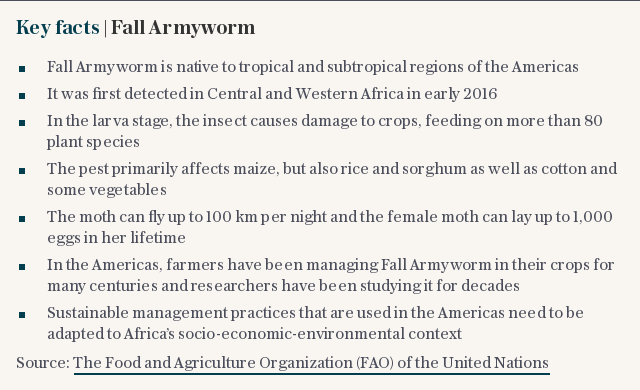Dreaded fall armyworm pest that devastated African crops found for the first time in India

A feared crop pest which has caused billions of dollars of agricultural devastation in Africa has been spotted in India for the first time, raising fears it will harm millions of farmers.
The Indian state of Karnataka has reported the continent's first infestation of fall armyworm which can spread at up to 60 miles a day and has a voracious appetite for maize and other crops.
The moth pest, which devours crops during the caterpillar phase of its lifecycle, has already spread at an alarming rate to neighbouring states. Agricultural experts say it is now likely to head into Southeast Asia and China.
Gopi Ramasamy, India director of the Centre for Agriculture and Bioscience International (CABI), said the pest's impact would be huge.
India grows nearly 22 million tons of maize which is used for both food and poultry feed. China is the world's largest maize-producing country after America.

“This is going to have a huge impact on food security and also on the poultry industry, so the countries have to move very fast,” he told the Telegraph.
As well as maize, the caterpillar attacks 80 crops, including rice, vegetables, groundnuts and cotton.
He said it was almost impossible to prevent the spread of the caterpillar.
He said: “We know it is a caterpillar which can spread very, very fast. By all probability we are expecting it to enter into Bangladesh, Nepal and all those countries on the Eastern side of India, including south east Asian and China.
The United Nations' Food and Agriculture Organization (FAO) said fall armyworm could threaten millions of small-scale farmers who depend on their crops for food as well as income. Southern China and Southeast Asia are at greatest risk due to their climate, it added.

With the worm almost impossible to stop or eradicate, Mr Ramasamy said attempting to control it was the most fruitful option to protect farmers.
The pest is native to tropical and subtropical regions of the Americas, but has spread rapidly across Africa since being detected in West Africa in early 2016.
Almost all sub-Saharan countries have reported infestations which have affected millions of hectares of crops.
In Africa, FAO field schools have taught farmers to spot and then crush the pest by hand and curb its spread with bio-pesticides made from plants like neem and tobacco or by using natural predators like ants.

Protect yourself and your family by learning more about Global Health Security

